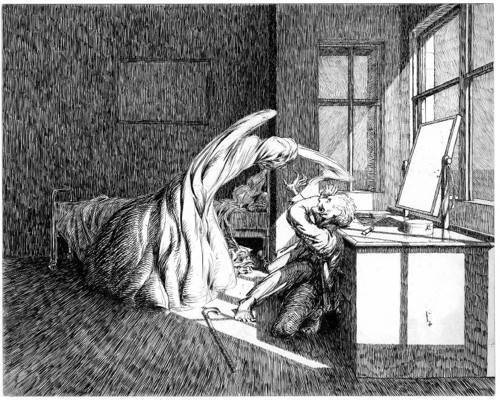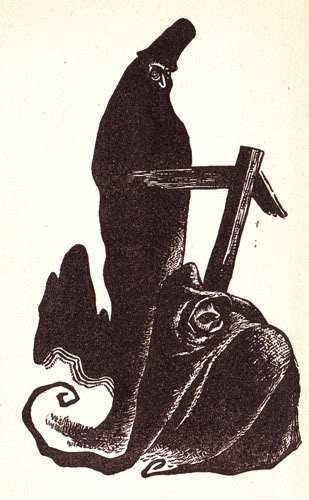 Canavan’s
Comments
(group member since May 15, 2018)
Canavan’s
Comments
(group member since May 15, 2018)
Canavan’s
comments
from the Spells, Space & Screams: Collections & Anthologies in Fantasy, Science Fiction, & Horror group.
Showing 961-980 of 1,078
 “Transmissions”, T. E. Grau
“Transmissions”, T. E. GrauThis story features Max, a vaguely unlikeable drifter in search of some greater truth. As all too often happens in these sorts of tales, he finds what he is looking for, although not in the place nor the manner he expects. (view spoiler)
✭✭✭
“The Dangsturm Interruption”, Joseph Bouthiette Jr.
(view spoiler)
✭½
 I finally forced myself to finish watching the first season of Castle Rock, which is streaming on Hulu. I guess I’d give it a thumbs up, but I really wanted to like this one more than I actually did. The producers managed to assemble of a solid cast, and we get some quality performances from Sissy Spacek, Scott Glenn, Melanie Lynskey, etc. The creative team even rounded up Thomas Newman to do the score. Without getting spoilerish, the project’s primary flaw is that there is just enough plot for a feature-length film, but not nearly enough for a 10-episode season. Hulu has already greenlit a second season, although it will feature a new cast and storyline.
I finally forced myself to finish watching the first season of Castle Rock, which is streaming on Hulu. I guess I’d give it a thumbs up, but I really wanted to like this one more than I actually did. The producers managed to assemble of a solid cast, and we get some quality performances from Sissy Spacek, Scott Glenn, Melanie Lynskey, etc. The creative team even rounded up Thomas Newman to do the score. Without getting spoilerish, the project’s primary flaw is that there is just enough plot for a feature-length film, but not nearly enough for a 10-episode season. Hulu has already greenlit a second season, although it will feature a new cast and storyline.✭✭✭½
 “If He Summons His Herd”, Matthew M. Bartlett
“If He Summons His Herd”, Matthew M. BartlettThis is the first story I’ve read by Mr. Bartlett. As best I can tell, he started writing in this genre about four years ago. No novels, just short stories, many of them appearing in two collections entitled Gateways to Abomination and Creeping Waves , focusing to a large degree on the fictional city of Leeds, Massachusetts. There are things about the story that I think Bartlett does well — the way he uses urban legend to set up the story, the way in which he paints Leeds as being pervaded by a sort of hopelessness, and the way he ties the story to the theme of this particular anthology. But there are, I think, some weak points. (view spoiler)
✭✭✭
 Lena said (in part):
Lena said (in part):Corinne sent me a PM due to our concern:
Thanks for posting Corinne’s message, Lena.
 Graeme said (in part):
Graeme said (in part):Somewhat sad and disturbed.
Indeed. Regardless of the reason for her departure, her presence will be missed.
 Lena, talking about “ ‘Oh, Whistle...’ ”, asked:
Lena, talking about “ ‘Oh, Whistle...’ ”, asked:Did anyone else note the pre Disneyland use of the name Disney?
This is a Cambridge allusion. The Disney Professorship of Archaeology is an endowed chair in archaeology at the University of Cambridge and the person holding it is referred to as the Disney Professor. It was endowed by John Disney in 1851 with a donation of £1,000, followed by a further £2,500 bequeath upon his death in 1857. M. R. James considered standing for this chair in 1891.
 Latasha wrote:
Latasha wrote:no, the one I have is edited by Richard dalby.
You’ve kinda piqued my curiosity, Latasha. I know who Dalby is, but I was not aware that he edited a collection of James stories with that title. No biggie, but if you find the time could you shoot me the name of the publisher and copyright date, either here or via pm?
 Final thoughts on the book for this month.
Final thoughts on the book for this month. This is one my “desert island” books. I still vividly remember stumbling across an old copy of James’ Collected Ghost Stories (1931), which contained these stories as well as others, and reading through the entire thing in a couple of days.
“Count Magnus” is my personal favorite of the stories in James’ first collection, although “Canon Alberic’s Scrap-Book” runs a very close second. But, while I obviously like some of these stories more than others, there are no real clinkers in this volume. Great stuff.
✭✭✭✭½
 “The Treasure of Abbot Thomas”
“The Treasure of Abbot Thomas”My reaction to this story as a whole is sorta similar to my reaction to “Lost Hearts” — “Treasure” is a very good story by most standards, but I’ve always regarded it as lessor James. (view spoiler)
✭✭✭✭
 Latasha wrote:
Latasha wrote:I have the collection Casting the Runes.
This is the one published by Oxford and edited by the late Michael Cox? I have that one too. It’s a solid edition. Barbara Roden and Christopher Roden, who edited A Pleasing Terror , co-opted most or all of Cox’s notes on the stories and added additional ones as well. And, of course, both Cox and the Rodens owe a huge intellectual debt to Rosemary Pardoe, who has for decades been editing a newsletter on M. R. James containing both fiction and scholarly articles.
 M.L. said:
M.L. said:I like James's writing so much I bought a hard copy with first and second. :)
I know that for many folks, it’s hard to justify spending hard-earned dollars for books that are freely available, but for my money the best electronic version of M. R. James’ work is A Pleasing Terror: The Complete Supernatural Writings . Originally published back in 2001 by Ash-Tree Press, hardback copies are now incredibly expensive, but the e-version is available for $10. It’s comprehensive and well annotated.
 “ ‘Oh, Whistle, and I'll Come to You, My Lad’ ”
“ ‘Oh, Whistle, and I'll Come to You, My Lad’ ”First of all — a nifty title for the story; maybe the only story title M. R. James ever came up with that showed a little panache.
(view spoiler)
✭✭✭✭½
James’ story has been adapted a number of times, twice by the BBC for the small screen (both times under the truncated title Whistle and I'll Come to You). It was first adapted in 1968 (directed by Jonathan Miller and starring Michael Hordern); the second appeared in 2010 and starred John Hurt. Most people (myself included) prefer the earlier work. (The Hurt version takes more liberties with the text.) The last time I checked, both versions could be found on YouTube.
 “Count Magnus” is perhaps my favorite of the stories in James’ first collection, but that may in part be because it was the very first James story I ever read, stumbling across it many years ago in an old anthology,
Sleep No More
(1944), edited by August Derleth and illustrated by Lee Brown Coye.
“Count Magnus” is perhaps my favorite of the stories in James’ first collection, but that may in part be because it was the very first James story I ever read, stumbling across it many years ago in an old anthology,
Sleep No More
(1944), edited by August Derleth and illustrated by Lee Brown Coye.(view spoiler)
✭✭✭✭✭
 “Number 13”
“Number 13”When I first read this one years ago, I wasn’t all that impressed, but the story has grown on me with repeated readings. (view spoiler)
✭✭✭✭½
 “The Ash-Tree”
“The Ash-Tree”Although this story seems to be a favorite of many, it is, in all honesty, my least favorite of those in this collection, although my lukewarm response may be more a product of my own biases than a comment on the author’s talents. (view spoiler)
✭✭✭
 Lena said:
Lena said:It’s the earliest story I’ve read where the monsters go for brains. Ghosts phantom brain eaters. What do you think the uncle was? Or was trying to become?
It’s actually hearts that everyone is so keen about in this story; both Mr. Abney, who seeks to consume “the hearts of not less than three human beings”, and the revenants of the Abney’s two victims, who, in wreaking their spectral vengeance, leave him with “a terrible lacerated wound, exposing the heart”.
Abney is a type of character that pops up now and again in James’ fiction — an individual dabbling in the black arts as way to acquire personal power. James paints him as, not so much evil, but as totally amoral; in his notes, for example, he repeatedly stresses how he views himself as being above laws and norms. Another example of such a character might be Mr. Karswell from “Casting the Runes”.
 Kimberly, discussing “Lost Hearts”, said (in part):
Kimberly, discussing “Lost Hearts”, said (in part):He has so many stories out, I wonder why he'd use one that he wasn't especially fond of???
Ghost Stories of an Antiquary was M. R. James’ first story collection (published in 1904), so options were limited. Only two of his stories, “Canon Alberic’s Scrap-Book” and “Lost Hearts”, had at that time seen prior magazine publication.
 Lena said:
Lena said:I had to go back to my review to remind myself of this little disaster movie. Obviously, not one of the memorable stories.
Yes, I suspect I’ll be in the same boat (no pun intended) a month or so from now.



